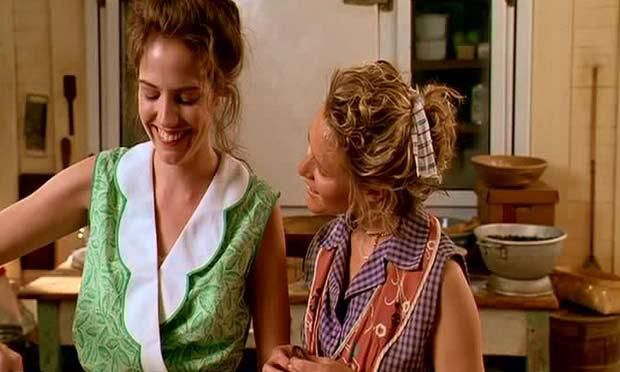
In a film built on quiet resilience and emotional healing, Fried Green Tomatoes delivers one unforgettable moment of unfiltered, explosive liberation—when Evelyn Couch, fed up with being overlooked and dismissed, rams her car into a pair of smug young women’s Volkswagen Beetle in a grocery store parking lot.
With a battle cry of “Towanda!” and a ferocity no one saw coming, Evelyn breaks free from the chains of politeness, passivity, and middle-aged invisibility.
The Scene: A Collision of Frustration and Freedom
Evelyn has just circled the parking lot multiple times, patiently waiting for a spot. As she signals to turn in, two young women in a red VW Beetle swoop in and steal it. When she protests, they mock her:
“Face it, lady. We’re younger and faster.”
It’s the straw that breaks the camel’s back.
Instead of swallowing the disrespect like she might have earlier in the film, Evelyn gets back into her car, floors it, and repeatedly slams into their vehicle. Each hit is punctuated by her triumphant war cry:
“Towanda! Righter of wrongs, queen beyond compare!”

Towanda: A Name, A Spirit, A Declaration
“Towanda” isn’t just a funny nickname Evelyn adopts — it’s her alter ego, the manifestation of all the power, confidence, and rage she’s suppressed over decades of being ignored by her husband, dismissed by society, and disrespected in public spaces.
This isn’t just petty revenge. It’s a symbolic rebirth.
Towanda becomes shorthand for every woman who’s ever bitten her tongue, smiled through condescension, or been told to “calm down.”
A Moment of Catharsis for Millions
What makes this scene iconic isn’t just the humor or shock value — it’s how relatable it is. Audiences, particularly women, often cheer during this moment. Because Evelyn’s outburst isn’t just about a parking space. It’s about decades of accumulated microaggressions.
Critics and psychologists have even pointed to this scene as a rare moment in film where female rage is not villainized. It’s not punished. It’s not made shameful. It’s celebrated. That’s powerful.
From Victim to Agent of Change
This scene also marks a turning point in Evelyn’s character arc. Until now, she’s been tentative — trying self-help tapes, struggling to assert herself, asking her husband for attention he never gives.
But this moment shows that something inside her has truly shifted. She’s not just fantasizing about change — she’s enacting it. From here on, we see a bolder, more decisive Evelyn. This parking lot rage becomes the spark for her empowerment.
Comedy as Subversion
The scene is undeniably funny — and that’s part of its brilliance. By wrapping Evelyn’s righteous anger in humor, the film disarms the audience while still delivering a bold message about agency and justice.
She doesn’t pull a gun or scream obscenities. She crashes a car — a suburban act of rebellion that’s both ridiculous and deeply satisfying.
It turns out, the minivan can be a weapon of revolution.
Feminist Commentary in Disguise
In a larger cultural context, this moment fits into a lineage of films where women reclaim power not by becoming villains, but by finally standing up for themselves. And it does so without losing heart, humor, or empathy.
Evelyn doesn’t become cruel. She becomes seen.
Lasting Impact
Years later, this scene continues to resonate. “Towanda!” has become a battle cry for generations of women who have hit their limit. It’s been printed on mugs, T-shirts, bumper stickers. And more importantly, it’s entered the cultural lexicon as a symbol of righteous, joyful fury.
Even viewers who haven’t seen the full film know this scene. It’s a classic because it feels like a secret victory shared among those who’ve been underestimated too long.
In a world where female anger is often labeled “hysteria,” Fried Green Tomatoes dares to say: sometimes, smashing a car is exactly what healing looks like.
Towanda lives on — not just in grocery store parking lots, but in every moment where someone chooses to stop being small.
